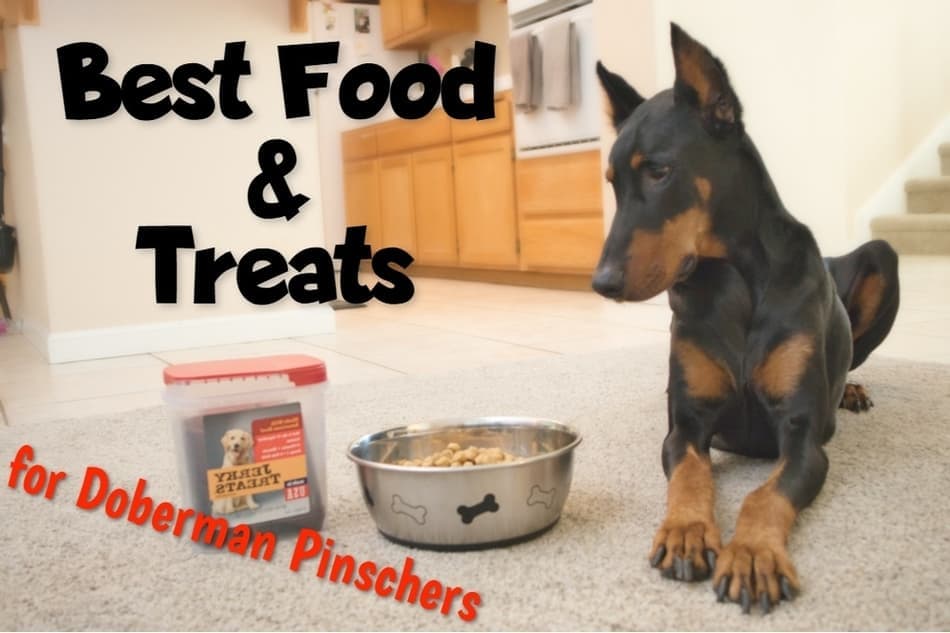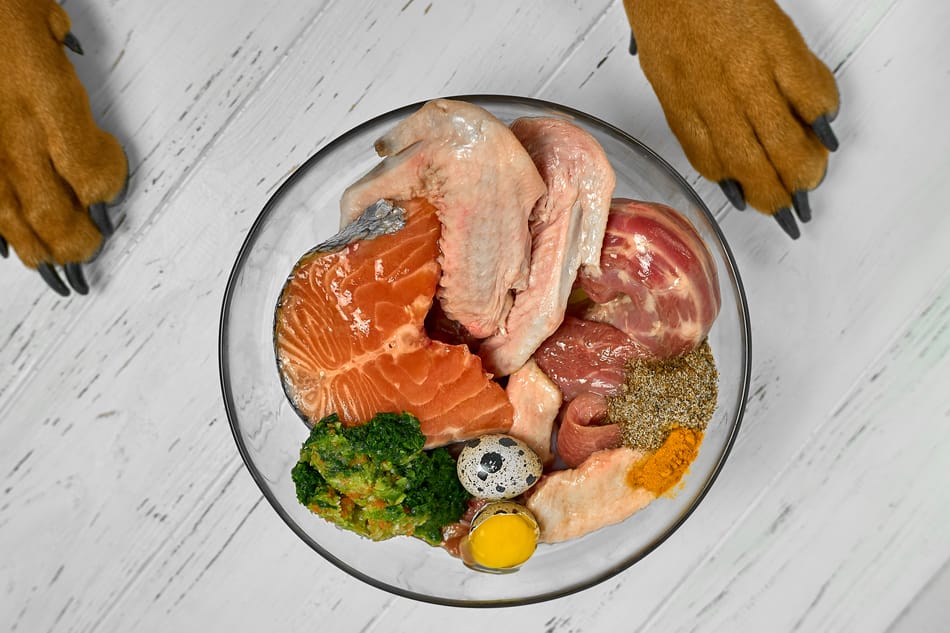When it comes to feeding a Doberman, their nutritional needs are unique and important to consider. Did you know that Dobermans are prone to certain health issues, such as dilated cardiomyopathy? This means that their diet plays a crucial role in maintaining their overall health and well-being.
Dobermans benefit from a high-quality, balanced diet that consists of a combination of proteins, carbohydrates, and fats. It is recommended to feed them a diet that is rich in lean meats, such as chicken, beef, or fish, as well as whole grains and vegetables. This provides them with the necessary nutrients, vitamins, and minerals to support their active lifestyle.
Dobermans require a balanced diet that is rich in protein. High-quality commercial dog food that is specifically formulated for large and active breeds is a good choice. Look for a food that lists meat as the first ingredient and avoid fillers like corn or wheat. Additionally, you can include fresh, lean meats, vegetables, and fruits as occasional treats. Remember to consult with your veterinarian for personalized dietary recommendations for your Doberman.

What Kind of Food Does a Doberman Eat?
A Doberman is a large and active breed of dog that requires a balanced and nutritious diet to maintain its health and energy levels. Feeding your Doberman the right kind of food is essential to ensure its overall well-being. In this article, we will explore the different aspects of a Doberman’s diet and provide you with valuable information on what kind of food is suitable for this breed.
1. The Importance of a Balanced Diet
Like all dogs, Dobermans require a balanced diet to meet their nutritional needs. A balanced diet consists of the right proportions of proteins, carbohydrates, fats, vitamins, and minerals. These nutrients play a crucial role in maintaining the dog’s energy levels, supporting its immune system, promoting healthy growth and development, and preventing nutritional deficiencies.
It is important to provide your Doberman with high-quality dog food that is specifically formulated for large breeds. This ensures that the food contains the necessary nutrients in the right proportions to meet their unique requirements.
2. Protein Requirements
Proteins are essential for muscle development, repair, and overall growth. Dobermans, being an active and muscular breed, require a diet rich in high-quality animal protein. Look for dog foods that list a high-quality protein source, such as chicken, beef, or fish, as the primary ingredient. Avoid dog foods that contain excessive fillers, by-products, or artificial additives.
The protein content in a Doberman’s diet should ideally be around 25-30% of their total calorie intake. However, individual protein requirements may vary depending on the dog’s age, activity level, and overall health.
3. Carbohydrate Sources
Carbohydrates provide energy for the Doberman’s daily activities and exercise. Look for dog foods that contain whole grains, such as brown rice or quinoa, as they are a good source of complex carbohydrates. Avoid foods that contain excessive amounts of fillers or simple carbohydrates, such as corn or wheat.
The carbohydrate content in a Doberman’s diet should be around 50% of their total calorie intake. However, it is important to note that each dog is unique, and individual carbohydrate requirements may vary.
4. Healthy Fats
Healthy fats are essential for a Doberman’s overall health and shiny coat. Look for dog foods that contain omega-3 and omega-6 fatty acids, which can be found in fish oil, flaxseed oil, or chicken fat. These fatty acids provide numerous health benefits, including reducing inflammation, improving skin health, and supporting cognitive function.
The fat content in a Doberman’s diet should be around 10-15% of their total calorie intake. However, it is important to monitor your dog’s weight and adjust the fat intake accordingly, as Dobermans are prone to weight gain.
5. Feeding Schedule and Portions
Establishing a consistent feeding schedule is important for a Doberman’s digestive health. Divide their daily food intake into two meals, spaced 8-12 hours apart. This allows for proper digestion and prevents bloating, a condition that Dobermans are prone to.
The exact portion size will depend on your dog’s age, weight, activity level, and overall health. Follow the feeding guidelines provided on the dog food packaging as a starting point, and adjust the portions as necessary to maintain a healthy weight.
6. Hydration
Water is crucial for a Doberman’s overall health and well-being. Make sure your dog has access to fresh and clean water at all times. Consider using a sturdy and spill-proof water bowl to prevent accidents and keep the water clean.
7. Treats and Supplements
Treats can be a part of your Doberman’s diet, but it is important to choose healthy options that are low in calories and do not contain any harmful ingredients. Opt for treats that are specifically formulated for large breeds and avoid giving them human food, as it can be unhealthy and potentially toxic for dogs.
Consult with your veterinarian before adding any supplements to your Doberman’s diet. While some supplements may be beneficial, it is important to determine the specific needs of your dog and ensure that the supplements are safe and appropriate.
8. Common Human Foods to Avoid
- Chocolate
- Onions and garlic
- Avocado
- Grapes and raisins
- Alcohol
- Caffeine
- Fruit seeds and pits
- Dairy products
- Salt
These foods can be toxic or harmful to dogs and should be avoided.
9. Regular Vet Check-ups
Regular veterinary check-ups are essential to monitor your Doberman’s health and ensure they are receiving the appropriate diet and care. Your veterinarian can provide you with specific recommendations based on your dog’s individual needs and make any necessary adjustments to their diet.
10. Exercise and Weight Management
Along with a balanced diet, regular exercise is important for a Doberman’s overall health and weight management. Engage your dog in daily physical activities, such as walks, runs, and play sessions.
Monitor your Doberman’s weight to ensure they maintain a healthy body condition. Obesity can lead to various health issues, including joint problems and heart disease.
Conclusion
Feeding your Doberman the right kind of food is crucial for their overall health, energy levels, and well-being. A balanced diet that includes high-quality proteins, complex carbohydrates, and healthy fats will ensure that your Doberman gets the nutrients they need. Remember to provide fresh water, choose treats and supplements wisely, and avoid feeding them any harmful human foods. Regular veterinary check-ups and exercise are also important aspects of caring for a Doberman. By following these guidelines, you can help keep your Doberman happy, healthy, and thriving.
Key Takeaways: What Kind of Food Does a Doberman Eat?
- Dobermans require a high-quality dog food that is specifically formulated for their breed.
- A balanced diet for a Doberman should include high-quality protein, healthy fats, fruits, and vegetables.
- Avoid feeding your Doberman table scraps or human food as it can lead to nutritional deficiencies and digestive issues.
- Consult with your veterinarian to determine the appropriate portion sizes and feeding schedule for your Doberman.
- Monitor your Doberman’s weight and adjust their diet as needed to maintain a healthy body condition.
Frequently Asked Questions
Dogs have dietary needs that vary by breed and size. When it comes to Dobermans, finding the right food for their specific nutritional requirements is crucial for their overall health and well-being. Here are some frequently asked questions about what kind of food a Doberman should eat.
1. What nutrients should be included in a Doberman’s diet?
A Doberman’s diet should consist of high-quality protein, healthy fats, complex carbohydrates, vitamins, and minerals. Protein is especially important for Dobermans as it supports their muscle development and repair. Sources of protein can include chicken, beef, fish, and eggs. Healthy fats, such as omega-3 fatty acids, are beneficial for their coat and skin health. Complex carbohydrates like brown rice or sweet potatoes provide energy and fiber. Essential vitamins and minerals can come from fruits and vegetables, which should be included in their diet as well.
It’s important to note that the specific nutrient requirements may vary based on factors like age, activity level, and any underlying health conditions. Consulting with a veterinarian can help determine the right balance of nutrients for your Doberman’s diet.
2. Should a Doberman be fed a raw or cooked diet?
There are different opinions on whether Dobermans should be fed a raw or cooked diet. Some owners opt for a raw diet, which includes feeding their dogs raw meat, organs, bones, and vegetables. Proponents of raw diets believe it mimics what dogs would eat in their natural habitat. However, it’s important to note that raw diets may carry a higher risk of bacterial contamination and can be more challenging to balance nutritionally.
Alternatively, a cooked diet that includes commercial dog food or home-cooked meals can also be a viable option. Commercial dog food brands specifically formulated for large breed dogs can provide the necessary nutrients. If you choose to cook meals for your Doberman, it’s important to ensure they are receiving a well-balanced diet with the correct proportions of protein, fats, carbohydrates, vitamins, and minerals.
3. Can Dobermans have allergies or sensitivities to certain foods?
Yes, Dobermans can develop allergies or sensitivities to certain foods, just like any other dog breed. Common allergens in dog food include beef, chicken, dairy, wheat, and soy. Symptoms of food allergies or sensitivities can include itching, digestive issues, ear infections, and skin irritations.
If you suspect your Doberman has a food allergy or sensitivity, it’s recommended to consult with a veterinarian. They may recommend an elimination diet or allergy testing to identify the specific allergens and advise on an appropriate diet plan.
4. How often should I feed my Doberman?
The frequency of feeding a Doberman can depend on its age and activity level. As puppies, Dobermans typically require more frequent meals to support their growth. It’s recommended to divide their daily food intake into three to four meals until they reach about six months old. Once they reach adulthood, two meals per day are usually sufficient.
However, it’s important to note that individual dogs may have different dietary needs. Some Dobermans may do well with free-feeding, where food is available at all times, while others may require a strict feeding schedule. Monitoring their weight and adjusting their portion sizes accordingly is crucial to maintaining a healthy weight.
5. Are there any foods that are toxic or harmful to Dobermans?
Yes, there are several foods that are toxic or harmful to Dobermans and should be avoided. These include chocolate, grapes, raisins, onions, garlic, caffeine, alcohol, and certain artificial sweeteners like xylitol.
These foods can cause various health issues, such as kidney damage, liver damage, anemia, and even death. It’s crucial to keep these foods out of your Doberman’s reach and ensure their diet consists of safe and nutritious options.

When it comes to feeding a Doberman, it’s important to provide a balanced and nutritious diet.
A high-quality commercial dog food that is specifically formulated for large breeds like Dobermans is a good choice.
Look for a food that lists meat as the first ingredient and avoids fillers and artificial additives.
It’s also important to consider your Doberman’s age, activity level, and any specific dietary needs they may have.
Consulting with your veterinarian can help you determine the best type and amount of food for your Doberman.
Remember to provide fresh water at all times and monitor your Doberman’s weight to ensure they maintain a healthy body condition.
